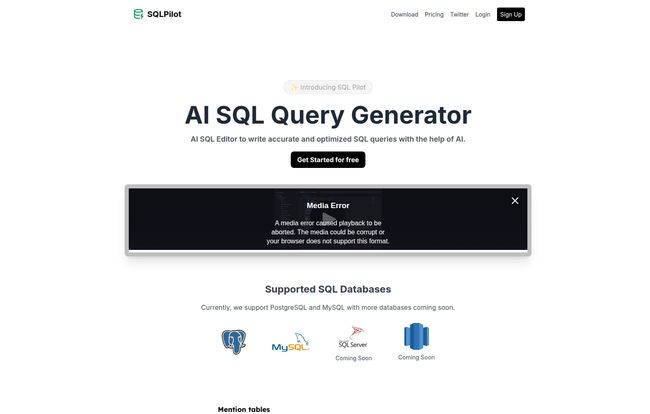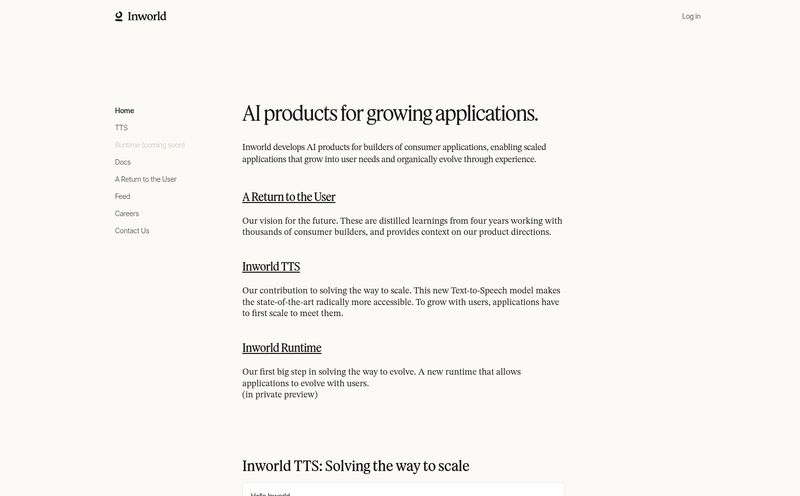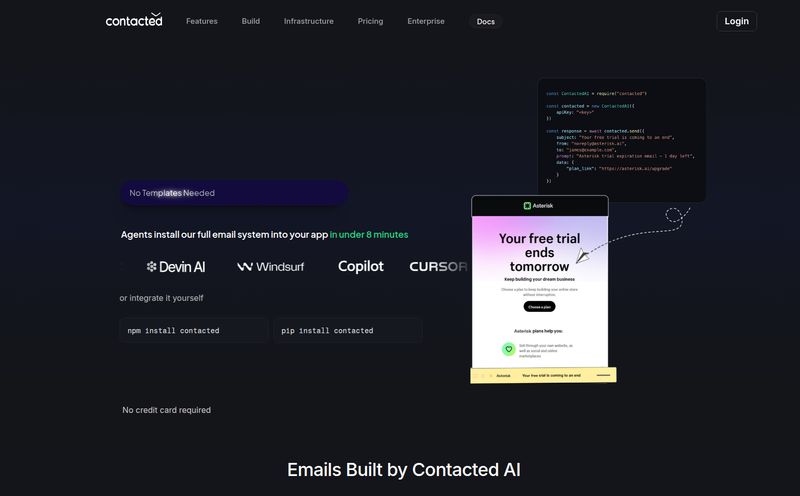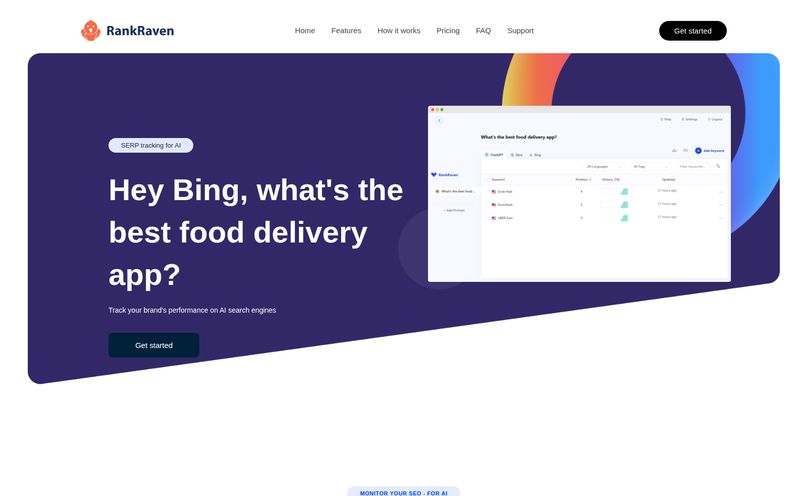Let’s get real for a minute. If you’ve ever worked with data, you’ve had that moment. You’re staring at a database schema with a dozen interconnected tables, and the simple question your boss asked—"What’s the monthly churn rate for customers who bought product X but not product Y?"—suddenly feels like you're being asked to decipher ancient hieroglyphics. You know the answer is in there, but coaxing it out with the right `JOIN`s, `GROUP BY`s, and `WHERE` clauses can be a slow, frustrating process.
I’ve been in that boat more times than I can count. My SQL skills are decent, but I’m not a database admin. I’m an SEO, a marketer. I need the data to do my job, but writing the perfect query isn't always the best use of my time. So, when I see a tool that promises to be my own personal AI “co-pilot” for SQL, my curiosity is definitely piqued. The latest one to cross my desk is SQLPilot, an AI-first SQL editor that claims to generate queries from plain old English. But does it actually work? Or is it just another tool on the AI hype train?
So, What is SQLPilot, Anyway?
At its heart, SQLPilot is a translator. You tell it what you want in natural language, and it translates that request into a functional, optimized SQL query. The idea is to connect it directly to your database (don't worry, we'll get to the security of that in a bit), which gives the AI the context of your specific tables and columns. No more trying to explain your entire schema to a generic chatbot.
Instead of you writing:SELECT u.name, o.order_date FROM users u JOIN orders o ON u.id = o.user_id WHERE u.signup_date >= '2023-01-01' AND o.amount > 100;
...you can just ask:
Show me the names and order dates for all users who signed up this year and have made a purchase over $100.
It’s a simple promise, but one that could be a massive time-saver for developers, data analysts, and even curious marketers like me.

Visit SQLPilot
The Features That Actually Matter
I’ve seen a lot of AI tools, and most are a mixed bag. But a few of SQLPilot’s features stood out to me as genuinely thoughtful and practical.
It Understands Your Data With a Knowledge Base
This is the big one for me. SQLPilot has something they call Knowledge Base / RAG Support. RAG, for the uninitiated, stands for Retrieval-Augmented Generation. In simple terms, it means the AI isn’t just pulling from its general knowledge. It actively retrieves information about your specific database schema to generate a better, more accurate query. It’s the difference between asking a random person for directions and asking a local who has a map. This context is what separates a useful query from a nonsensical one that just hallucinates table names. It turns your database schema into a personalized cheat sheet for the AI.
A Strong Stance on Privacy and Security
Okay, this is the part where anyone responsible for a production database gets a little nervous. Connecting a third-party tool to your data? Scary stuff. I was relieved to see SQLPilot address this head-on. According to their site, they do not store your database schemas, the queries you generate, or your credentials. The data you provide is only used to give the AI context for that one-time generation. This is a huge green flag. In my opinion, any tool that doesn’t make this a priority isn't worth considering.
You Can Bring Your Own Brain (and Key)
SQLPilot supports multiple OpenAI models, including GPT-3.5, GPT-4, and the new, zippy GPT-4o. It also allows you to use your own OpenAI API key. This is great for a couple of reasons. First, it gives you control over your costs and usage. Second, it shows a level of transparency; they’re not hiding the engine under the hood or overcharging you for API calls. You can choose the model that fits your needs—cheaper and faster with GPT-3.5 for simple stuff, or more powerful and nuanced with GPT-4/4o for the real head-scratchers.
A Quick Look at the Workflow
The interface seems refreshingly simple. Based on the walkthroughs, the process is dead simple:
- Connect your database. Right now, it supports PostgreSQL and MySQL, which covers a huge chunk of web applications. They say more database options are coming soon, which is good to hear.
- Write your prompt. Just type what you need in plain English.
- Select relevant tables. This helps narrow the focus for the AI, which is a smart touch to improve accuracy.
- Generate and review. The AI spits out a query. You can check it, tweak it if needed, and run it. You can then download the results as a CSV, which is always handy.
It's straightforward. No massive learning curve. The goal is to get you from question to data as fast as possible.
What's the Damage? A Look at SQLPilot's Pricing
This is often the make-or-break point. I was pleasantly surprised here. The pricing is very reasonable and they offer a genuinely useful free tier, not just a crippled demo.
| Plan | Price | What You Get |
|---|---|---|
| Free | $0 | Use your own OpenAI Key. Comes with a monthly quota of 20 GPT-4, 10 GPT-4o, and 50 GPT-3.5-turbo generations. |
| Pro | $9 / month | Everything in the Free plan, but with much higher limits: 500 GPT-4, 200 GPT-4o, and 2000 GPT-3.5-turbo generations, plus priority support. |
Honestly, the free plan is perfect for individuals or small teams who just need occasional help. It lets you fully test the waters without spending a dime. But for anyone who works with data regularly, the Pro plan at $9 a month is a no-brainer. If it saves you even one or two hours of work a month—and it absolutely will—it's already paid for itself. It’s less than two fancy coffees.
The Final Verdict: Is SQLPilot a Worthy Co-Pilot?
So, is it worth integrating into your workflow? In my experience, the biggest bottleneck in data analysis isn't a lack of data, it’s the friction in accessing it. Tools like SQLPilot are designed to grease those wheels.
Of course, it's not perfect. The reliance on AI means you should always double-check the generated queries before running them on a critical database. Think of it as a brilliant but sometimes overeager intern. You still need to provide oversight. And the current limitation to PostgreSQL and MySQL might be a deal-breaker for teams using SQL Server, Oracle, or others, at least for now.
But the upside is huge. It dramatically lowers the barrier to entry for asking complex questions of your data. It empowers non-technical team members and speeds up the workflow for seasoned developers. For me, the combination of the smart knowledge base feature, the strong privacy stance, and the incredibly fair pricing makes SQLPilot a tool I’m genuinely excited about. It's one of the first AI-powered dev tools I've seen that feels less like a novelty and more like a staple of a modern data workflow.
Frequently Asked Questions about SQLPilot
What exactly is SQLPilot?
SQLPilot is an AI-powered SQL editor that lets you write a request in plain English (e.g., "show me all users from New York") and then generates the correct SQL query for you. It connects to your database to understand its structure for better accuracy.
Is it safe to connect my database to SQLPilot?
Security seems to be a top priority. SQLPilot states that it does not store your database credentials, schema, or the queries you run. It uses the information temporarily to generate the query and then discards it, which is a strong practice for privacy.
How is this different from just asking ChatGPT to write SQL?
The key difference is context. While ChatGPT can write generic SQL, SQLPilot connects to your actual database. It uses a Knowledge Base (RAG) to understand your specific table names, columns, and relationships, leading to far more accurate and relevant queries without you having to manually describe your schema.
What databases does SQLPilot currently support?
As of now, SQLPilot supports PostgreSQL and MySQL. They have indicated that support for more SQL databases is coming in the future.
Can I really use it for free?
Yes. The free plan allows you to use your own OpenAI API key and gives you a generous number of monthly query generations across different GPT models. It's a great way to try out the full functionality.
Do I need to be an expert in SQL to use it?
Not at all. It's designed for both beginners and experts. Beginners can get answers without knowing complex syntax, and experts can speed up their workflow by automating the tedious parts of query writing.
Final Thoughts
We're going to see more and more AI integrated into our daily tools, and the ones that succeed will be those that solve a real, nagging problem. Wrestling with SQL is one of those problems. SQLPilot seems to have found a smart, secure, and accessible way to tackle it. If you spend any amount of time trying to get answers from a database, you owe it to yourself to give their free plan a spin.



